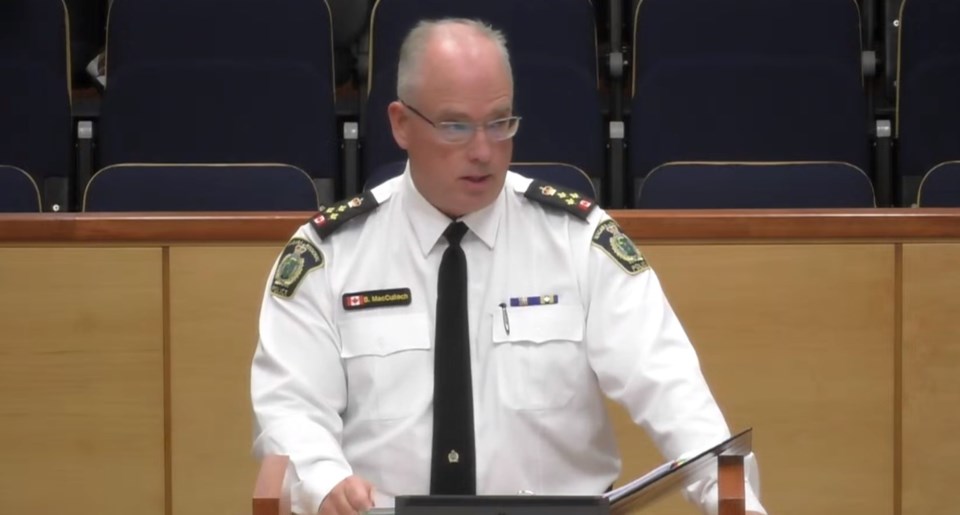The Niagara Regional Police Service’s 2024 budget has been handcuffed by regional council until next month.
When Chief Bryan MacCulloch presented the police’s proposed $190 million spending plan, it brought a 7.1 per cent increase to what was allotted by the regional government for 2023.
After being interrogated by regional politicians for more than two hours, it was decided that the budget be sent back to the police services board and reconsidered by council on Dec. 7.
A news release from the NRP on Monday said the board has called a meeting for Dec. 4.
The police service is asking to be accommodated with an inflationary adjustment of 4.8 per cent from the 2023 approved budget, to maintain core services, and includes an additional 2.3 per cent increase for service enhancements, stabilization, and growth, adding up to more than $12 million in additional funding.
This includes the hiring of 20 new officers, plus an additional seven to fill vacancies that are currently open within the service, along with several civilian positions, MacCulloch told councillors. He also noted that another 16 officers are needed, but a request for those has been deferred to future budgets.
The City of Niagara Falls covers costs related to the casino patrol unit, an agreement formed many years ago when the first casino opened in the honeymoon capital, and expected to exceed $5 million in 2024. Asked if the police budget could pull more from Niagara Falls, MacCulloch said that’s out of his jurisdiction. “I don’t think it’s appropriate, and I have no leverage, or ability, or hammer, to have the city pay whatever is requested,” said the chief.
When local detachments can’t meet their minimum staffing levels, which fluctuates on different days of the week and on weekends, officers are often redeployed to other areas of the region.
This occurred 715 times in 2022 and on 752 occasions so far this year.
“It’s a significant draw on resources,” said MacCulloch, also pointing to parental and sick leaves playing roles.
Lincoln Reg. Coun. Rob Foster said he was having difficulty with the request for additional programs and hires, when other agencies, boards, and commissions under the region’s umbrella have all been told to hold the line.
“We’ve tried to take a responsible, incremental approach to our ask,” said MacCulloch, who also noted in the meeting that the 7.1 per cent increase started as a 9.9 per cent hike when the police board started working on its 2024 budget.
“We recognize the impact it’s having on the taxpayers of the Niagara region, but we also recognize the increased demand and ever-increasing expectations that are being placed on us through the courts and provincial legislation,” said MacCulloch.
Niagara-on-the-Lake Lord Mayor Gary Zalepa said he’d prefer to see actuals in the budget, not year-to-year budgets outlined in what was presented to regional council.
He also said he didn’t “see a driving need identified” in the budget presentation that equates to a proposed 7.1 per cent increase.
Regional chair Jim Bradley questioned a number of “program changes” and “enhancements” as they are described in the budget report – mostly civilian positions the police service is looking to either create or expand on, at a cost of almost $5.9 million.
This also includes 20 new frontline constables.
Some of the jobs include a communications training coordinator with an annual salary of almost $148,000, and a visual content creator who would earn more than $112,000 in one year.
“I don’t know if it is this year, in fact, I know it isn’t,” said Bradley about the timing of these requests.
Bradley also said that if council doesn’t accept the budget, the police board has the ability to enter a process with what he called “O-Cops,” which is the Ontario Civilian Police Commission, a provincial adjudicator that can investigate budgetary disputes between police services and municipal governments.
“I know it’s a bit of a defeat when you do that, but it’s an avenue that’s available,” he said, shortly before a vote was taken to send the budget back to the police services board.



